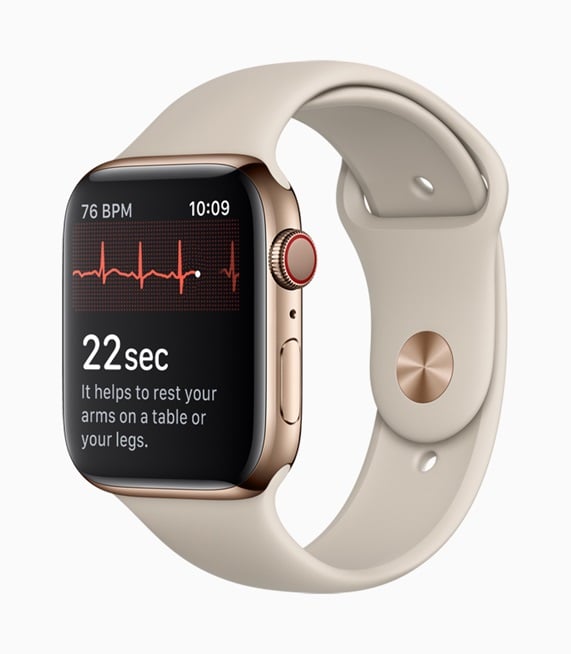
Apple just released its series 4 watch with ECG functionality approved by the Food and Drugs Administration. This qualifies it as a medical device.
The device will only be available in the US for now. It is the first over-the-counter ECG sold directly to consumers. The watch has electrodes built into the digital crown and the back crystal works together with the ECG app to read ones heart’s electrical signals.
This is about putting some part of health management in the hands of the consumers and having them actively participating in their own health. It also fosters individualised care because watch tracks the heart rate pattern of the user, analysing the data, and alerting the user when an irregular heartbeat is recorded. The users can also decide to take an ECG at any time and share the PDF version of the ECG with their doctors.
The ECG feature is a product of research conducted in collaboration with Stanford University. The watch is quite expensive and it is assumed that in South Africa it will be accessible to people from the middle class and members of medical aid schemes offering them such devices.
There is no doubt that such information will be beneficial to individuals at risk by facilitating early detection of atrial fibrillation, an abnormal heart rhythm. Early warning facilitates early conformation of the diagnosis followed by early intervention thus preventing late presentation, which may lead to high hospitalisation costs and, even fatal clinical outcomes.
Apple is expected to collect more data from these devices and use artificial intelligence (AI) to enhance this feature and probably develop new features. This raises some ethical concerns related to informed consent for continuous collection of personal data using the watch, ownership of the data, who gets to access the data, the use of this data and importantly, the end-user benefits on new features and development of new applications informed by crowd-sourced data.
At the same time, one cannot discount the potential greater good of AI facilitating increased access to screening, diagnosis, and care.
The watch also detects falls using its new accelerometer and gyroscope. When a hard fall is detected this occurs and one is unresponsive after 60 seconds, the emergency call will be placed automatically and a message will be sent to the emergency contacts. A person can also dismiss the alert.
Wearables are changing the way patients engage with their own health information. This watch will definitely increase the number of alerts and possibly drive emergency department and GP visits related to possible atrial fibrillation. Doctors need to be aware and keep up with health technology developments, especially those related to self-care, their reliability (false negatives and positives) and play a role in educating patients about the difference between a screening and diagnostic test.
Medico-legal considerations will have to be taken into account because new technology may bring a new challenges and opportunities. We should not forget the compounding factor of Dr Google, which may lead to anxiety for both doctors and patients
These technological advancements will change how doctors do their work and influence how they engage with patients.
Doctors have to keep abreast with technological advancements and embrace their advisory and oversight role in self-care, which may include prescribing these devices to high-risk patients. There has been mixed feelings about the ECG feature from cardiologists, some claiming that is a rhythm tracer based on one lead thus not replacing a 12-lead ECG performed by medical professionals. Others are concerned about false positives and the associated anxiety, which may induce an abnormal heart rhythm. I still have slight discomfort about allowing patients to perform their “own ECG” tests and expect their health service providers to look at them at any time of the day.
When and if it comes to South Africa, we’ll have to tackle issues related to medical aid schemes reimbursement for the doctor’s interpretation of the ECG tracings received from patients and possible telephonic consultations followed by a definitive ECG.
I am also wondering how this will work in the South African context where we have different emergency numbers – 10177 and 112 – unlike the US where they use only one emergency number, 911. Miniaturisation of medical devices, bringing them to the patients’ hands, AI, and digital communication are the future of health care and they are calling for “business unusual” from all role players.
• Dr Brenda Kubheka is from Health IQ Consulting, which does quality management, clinical risk and lean methodology training programmes and consulting services in the health sector.




 Publications
Publications
 Partners
Partners








